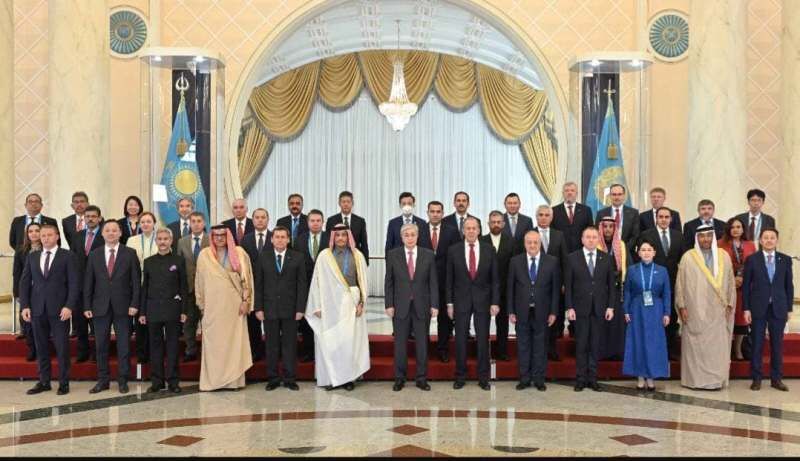Iran has rejected alliances with third parties to resolve regional disputes


According to IRNA on Tuesday, Alireza Haghighian spoke at the sixth meeting of the Foreign Ministers of the Conference on Interaction and Confidence-Building Measures in Asia (CICA) focusing on “Security and Sustainable Development in Asia Based on New World Realities”. He called regional cooperation one of the elements of the foreign policy of the government of the Islamic Republic of Iran and stressed the need for Sika to become more active in order to take advantage of the opportunities ahead and to avoid threats.
In their speeches, Haghighiyan addressed various issues such as the formation of a united front to overcome challenges such as the Covid-19 epidemic, the need for constructive interaction and synergy to achieve real sustainable and endogenous security and sustainable development in the region, emphasizing the fundamental policy of the Islamic Republic Iran seeks to strengthen good neighborliness, build trust, open dialogue with neighbors and other Asian countries, review several Iranian peace initiatives to help resolve regional crises, work closely with countries in the region to eliminate major threats such as Takfiri terrorism And emphasizing the need to increase multilateral cooperation between Sika member states, resolve existing issues between neighbors through dialogue and resort to political solutions between them, and reject any alliance or alliance with third parties, especially entities with a black history of aggression, terror, He paid for espionage, conspiracy, war crimes and crimes against humanity, apartheid and gross human rights abuses.
The Assistant Secretary-General and Director General for Eurasia also noted the continuing consequences of apartheid in the Occupied Palestinian Territories, the denial of the basic rights of the Palestinian people and the daily killing of Palestinian children, and the escalation of the crimes of the occupying regime in Jerusalem. He stressed and stressed that the escalation of the situation in the Occupied Palestinian Territories, including Holy Quds, should be strongly condemned as a clear and systematic violation of human rights, humanitarian law and international law by the Zionist nature.
Haghighiyan further emphasized the special position of Sika in the foreign policy of the Islamic Republic of Iran as a precious assembly consisting of Asian countries, especially 11 neighboring countries of Iran, and in this regard, promoting Sika to a regional organization through systematic and scheduled negotiations. Sika welcomed.
In response to the false allegations of the representative of the Zionist regime, the Assistant Minister of Foreign Affairs of our country denied all the accusations against our country and stated that the Zionist regime, due to its horrible history of bloodshed, rape, apartheid, etc., is not legal. Nor is it politically or morally competent to comment on legitimate political systems, including the Islamic Republic of Iran.
He added that the representative of the Zionist regime should explain to the member countries about the secret military nuclear program and hundreds of nuclear bombs and other types of weapons of mass destruction.
Haghighian said: “The history of the Zionist regime is full of killings, torture, imprisonment and expulsion of the Palestinian people, and this regime is the biggest threat to the security and stability of the Middle East.”
The 6th Sika Foreign Ministers ‘Meeting, in addition to hearing the views and opinions of member state officials, also adopted a document entitled “Statement of the Sixth Foreign Ministers’ Meeting”.
This statement was the result of 10 rounds of difficult negotiations in which all the proposals of the Islamic Republic of Iran were agreed and approved in the final text of the statement. Reaffirms the rejection of unilateral coercive measures, supports multilateralism, rejects the connection of terrorism with any religion, culture, etc., emphasizes the role of the international community in assisting the displaced and displaced Afghans, especially in the recent crisis in the country. Regarding the common problems of the countries of the world, the need for fair and equal public access to medical facilities and vaccines in the field of Quaid-19, especially vaccines, and support for Egypt’s proposal for a nuclear-free Middle East and Palestine are among the most important successes of the Republic. Islami was in the discussion of drafting a final statement.
Despite the presence and strong protest of the Zionist representative, the Sika member states expressed concern over the current situation in the Middle East, called on all stakeholders to implement the provisions of the UN resolutions in order to achieve peace, security and stability in the region. They affirmed their commitment to the inalienable right of Palestine to an independent state. Condemning the unilateral measures taken to change the situation in Jerusalem, they stressed the importance of the United Nations’ response and role in supporting the displaced Palestinians.
The Foreign Ministers Meeting of the Conference on Interaction and Confidence-Building Measures in Asia (CICA) is held every two years with the participation of ministers and senior officials of member countries.
The Sixth Session of the Ministers of Foreign Affairs of the Conference on Interaction and Confidence-Building Measures in Asia (CICA) was held on 19 and 20 October 1400 (equivalent to 11 and 12 October 2021) under the chairmanship of Kazakhstan in Nursultan.
The Conference on Interaction and Confidence-Building Measures in Asia (CICA) aims to establish a structure and mechanism for dialogue and interaction to ensure peace and security in the Asian region and currently has 27 permanent members, 9 supervisory members and 5 oversight bodies.
.

